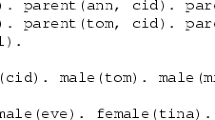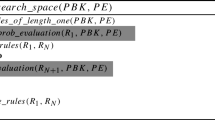Abstract
Inductive Logic Programming (ILP) is a well known approach to Multi-Relational Data Mining. ILP systems may take a long time for analyzing the data mainly because the search (hypotheses) spaces are often very large and the evaluation of each hypothesis, which involves theorem proving, may be quite time consuming in some domains. To address these efficiency issues of ILP systems we propose the APIS (And ParallelISm for ILP) system that uses results from Logic Programming AND-parallelism. The approach enables the partition of the search space into sub-spaces of two kinds: sub-spaces where clause evaluation requires theorem proving; and sub-spaces where clause evaluation is performed quite efficiently without resorting to a theorem prover. We have also defined a new type of redundancy (Coverage-equivalent redundancy) that enables the prune of significant parts of the search space. The new type of pruning together with the partition of the hypothesis space considerably improved the performance of the APIS system. An empirical evaluation of the APIS system in standard ILP data sets shows considerable speedups without a lost of accuracy of the models constructed.
Access this chapter
Tax calculation will be finalised at checkout
Purchases are for personal use only
Similar content being viewed by others
Notes
- 1.
Counting the number of examples derivable from the hypothesis and the background knowledge.
- 2.
As many as the size of the sample.
- 3.
Opposite from what happens when literals share variables.
- 4.
Source data for both data sets is available from the Distributed Structure-Searchable Toxicity (DSSTox) Public Data Base Network from the U.S. Environmental Protection Agency http://www.epa.gov/ncct/dsstox/index.html,accessed Dec 2008.
- 5.
- 6.
Except for the carcinogenesis data set.
References
Bone, P., Somogyi, Z., Schachte, P.: Estimating the overlap between dependent computations for automatic parallelization. TPLP 11(4–5), 575–591 (2011)
Camacho, R.: IndLog — induction in logic. In: Alferes, J.J., Leite, J. (eds.) JELIA 2004. LNCS (LNAI), vol. 3229, pp. 718–721. Springer, Heidelberg (2004)
Camacho, R., Pereira, M., Costa, V.S., Fonseca, N.A., Adriano, C., Simoes, C.J.V., Brito, R.M.M.: A relational learning approach to structure-activity relationships in drug design toxicity studies. J. Integr. Bioinform. 8(3), 182 (2011)
Casas, A., Carro, M., Hermenegildo, M.V.: A high-level implementation of non-deterministic, unrestricted, independent and-parallelism. In: Garcia de la Banda, M., Pontelli, E. (eds.) ICLP 2008. LNCS, vol. 5366, pp. 651–666. Springer, Heidelberg (2008)
Clare, A.J., King, R.D.: Data mining the yeast genome in a lazy functional language. In: Dahl, V. (ed.) PADL 2003. LNCS, vol. 2562, pp. 19–36. Springer, Heidelberg (2002)
Costa, V.S., de Castro Dutra, I., Rocha, R.: Threads and or-parallelism unified. TPLP 10(4–6), 417–432 (2010)
Dehaspe, L., De Raedt, L.: Parallel inductive logic programming. In: Proceedings of the MLnet Familiarization Workshop on Statistics, Machine Learning and Knowledge Discovery in Databases (1995)
Fonseca, N.A., Costa, V.S., Rocha, R., Camacho, R., Silva, F.: Improving the efficiency of inductive logic programming systems. Softw. Pract. Exper. 39(2), 189–219 (2009)
Fonseca, N.A., Silva, F., Camacho, R.: April – an inductive logic programming system. In: Fisher, M., van der Hoek, W., Konev, B., Lisitsa, A. (eds.) JELIA 2006. LNCS (LNAI), vol. 4160, pp. 481–484. Springer, Heidelberg (2006)
Fonseca, N.A., Srinivasan, A., Silva, F.M.A., Camacho, R.: Parallel ilp for distributed-memory architectures. Mach. Learn. 74(3), 257–279 (2009)
The MPI Forum: Mpi: a message passing interface (1993)
Gupta, G., Pontelli, E., Ali, K.A.M., Carlsson, M., Hermenegildo, M.V.: Parallel execution of prolog programs: a survey. ACM Trans. Program. Lang. Syst. 23(4), 472–602 (2001)
Matsui, T., Inuzuka, N., Seki, H., Itoh, H.: Comparison of three parallel implementations of an induction algorithm. In: 8th International Parallel Computing Workshop, Singapore, pp. 181–188 (1998)
Moura, P., Crocker, P., Nunes, P.: High-level multi-threading programming in logtalk. In: Hudak, P., Warren, D.S. (eds.) PADL 2008. LNCS, vol. 4902, pp. 265–281. Springer, Heidelberg (2008)
Muggleton, S.: Inverse entailment and Progol. New Gener. Comput., Spec. Issue Induct. Log. Program. 13(3–4), 245–286 (1995)
Muggleton, S., Firth, J.: Relational rule induction with CProgol4.4: a tutorial introduction. In: Džeroski, S., Lavrač, N. (eds.) Relational Data Mining, pp. 160–188. Springer, Heidelberg (2001)
Ohwada, H., Mizoguchi, F.: Parallel execution for speeding up inductive logic programming systems. In: Arikawa, S., Nakata, I. (eds.) DS 1999. LNCS (LNAI), vol. 1721, pp. 277–286. Springer, Heidelberg (1999)
Ohwada, H., Nishiyama, H., Mizoguchi, F.: Concurrent execution of optimal hypothesis search for inverse entailment. In: Cussens, J., Frisch, A.M. (eds.) ILP 2000. LNCS (LNAI), vol. 1866, pp. 165–173. Springer, Heidelberg (2000)
Costa, V.S., Srinivasan, A., Camacho, R., Blockeel, H., Demoen, B., Janssens, G., Struyf, J., Vandecasteele, H., Van Laer, W.: Query transformations for improving the efficiency of ILP systems. J. Mach. Learn. Res. 4, 465–491 (2003)
Camacho, R., Blockeel, H., Demoen, B., Janssens, G., Struyf, J., Vandecasteele, H., van Laer, W.: Query Transformations for Improving the Efficiency of ILP Systems. J. Mach. Learning Res. Ashwin Srinivasan 4, 465–491 (2003)
Skillicorn, D.B., Wang, Y.: Parallel and sequential algorithms for data mining using inductive logic. Knowl. Inf. Syst. 3(4), 405–421 (2001)
Srinivasan, A.: The Aleph Manual (2003). http://web.comlab.ox.ac.uk/oucl/research/areas/machlearn/Aleph
Wielemaker, J.: Native preemptive threads in SWI-prolog. In: Palamidessi, C. (ed.) ICLP 2003. LNCS, vol. 2916, pp. 331–345. Springer, Heidelberg (2003)
Woo, Y.T., Lai, D., McLain, J.L., Manibusan, M.K., Dellarco, V.: Use of mechanism-based structure-activity relationships analysis in carcinogenic potential ranking for drinking water disinfection by-products. Environ. Health Perspect. 110, 75–87 (2002)
Acknowledgments
This work has been partially supported by Fundação para a Ciência e Tecnologia (FCT) through the project ADE (PTDC/EIA-EIA/121686/2010 (FCOMP-01-0124-FEDER-020575)). The work was also partial supported by project NORTE-07-0124-FEDER-000059, financed by the North Portugal Regional Operational Programme (ON.2 O Novo Norte), under the National Strategic Reference Framework (NSRF), through the European Regional Development Fund (ERDF), and by national funds, through the Portuguese funding agency, FCT.
Author information
Authors and Affiliations
Corresponding author
Editor information
Editors and Affiliations
A Composition of the Dataset’s Islands
A Composition of the Dataset’s Islands
Table 5 shows the partial composition of the islands that where used to define the hypothesis sub-spaces. In the table we show only the predicates that appear in the models constructed in the sequential execution runs.
Rights and permissions
Copyright information
© 2014 Springer-Verlag Berlin Heidelberg
About this paper
Cite this paper
Camacho, R., Ramos, R., Fonseca, N.A. (2014). AND Parallelism for ILP: The APIS System. In: Zaverucha, G., Santos Costa, V., Paes, A. (eds) Inductive Logic Programming. ILP 2013. Lecture Notes in Computer Science(), vol 8812. Springer, Berlin, Heidelberg. https://doi.org/10.1007/978-3-662-44923-3_7
Download citation
DOI: https://doi.org/10.1007/978-3-662-44923-3_7
Published:
Publisher Name: Springer, Berlin, Heidelberg
Print ISBN: 978-3-662-44922-6
Online ISBN: 978-3-662-44923-3
eBook Packages: Computer ScienceComputer Science (R0)




